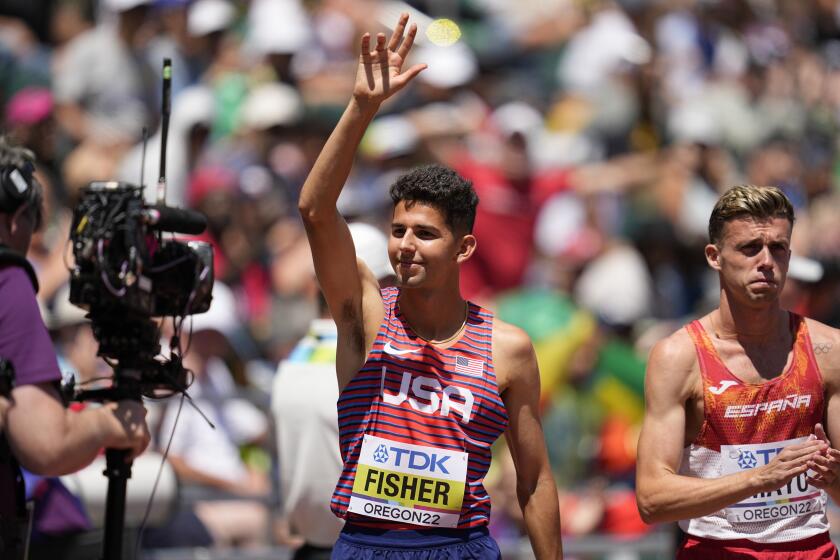Brendan Hansen says swimsuit rules change puts focus back on athletes
LONDON — Brendan Hansen: breaststroker, soon-to-be father and knowing seer.
Days before the first official splash of the Olympic Games, Hansen was discussing life after the now-banned swimsuits, the ones responsible for the avalanche of world-record swims.
“The spotlight draws back to the athletes,” Hansen said. “Now it is, may the best swimmer win. It’s not like: ‘Should I be wearing that suit?’ In the past Olympics, you’re looking at the guy next to you, ‘Can I beat this guy?’ But more so, ‘Should I be wearing his suit?’
“Everyone is getting back to what this is all about: drag racing.”
Skeptics were saying that world records would be rare in these Games and cut interest in the sport. But there have been three in the first two days of this Olympic meet.
Hansen said the depth of the pool reminded him, in some ways, of the temporary one installed at Rod Laver Arena in Melbourne, Australia, for the world championships in 2007.
Hansen, swimming in his third Olympics, got on the podium Sunday, winning the bronze in the men’s 100-meter breaststroke. It was his fifth Olympic medal.
“I think the pool is as fast, if not faster than the one in Beijing,” he said last week. “You come to the Olympics and you can swim in a puddle; it doesn’t matter. You are going to race no matter what.”
Britain’s first medal
OK, the long nightmare is over for Britain.
Not winning a medal around here for a day or two could have easily turned into a very big deal. If three days had passed with no medals, it would have been time to assemble a Royal Commission to figure out what went wrong.
Thankfully, Lizzie Armitstead came to the rescue.
The rain-drenched women’s cycling road race came down to a furious sprint between Marianne Vos of the Netherlands and Armitstead on the Mall, and when it was over Britain had its first medal, a silver, of the London Olympics, ending a day and a half of doubt.
Vos held off Armitstead’s charge, closing hard in the 80-mile race beset by highly difficult conditions. The Dutch cyclist actually had started out as a speedskater and won the gold medal in the points race four years ago in Beijing.
Britain, though, was hoarding the happiness Sunday with its first medal, and its young cyclist was almost giddy. Well, as giddy as you can be after riding 80 miles.
“It’s really strange,” Armitstead, 23, said in her BBC interview moments after the race. “I don’t know what I feel like. I’m a bit shocked.... It’s the most special thing I’ve experienced in my life.
“It’s so crazy and so inspiring. It was absolutely amazing. I didn’t even feel my legs, it was just so special.”
— Lisa Dillman
Gymnast fails doping test
Luiza Galiulina, a 20-year-old female gymnast from Uzbekistan, was provisionally suspended from the Olympics after she failed a doping test, pending the outcome of her “B” sample.
Galiulina’s “A” sample, taken Wednesday, tested positive for a banned diuretic, furosemide. The International Olympic Committee said Galiulina said she did not know how the furosemide got into her system.
On Saturday, Albanian weightlifter Hysen Pulaku became the first athlete expelled from the Games because of a failed doping test.
— Diane Pucin
Gold standard
So what’s a lifetime of blood, sweat and tears worth? At the London Olympics, the market value is about $708.
That’s the going rate for the gold contained in the gold medals that will be handed out over the next two weeks, according to the World Gold Council. Although that may not sound like much, the high price of gold makes this year’s top prize more valuable than any handed out in the history of the modern Olympics.
And while the athletes will certainly disagree, judging strictly from the precious metals that make up the precious medals, there’s not much difference between first and second since the London golds are actually 92.5% silver, 6.16% copper and just 1.34% gold.
Why fudge on the gold?
Well, given the fact the London medals are 412 grams in weight — the heaviest in Olympic history — a gold medal made of solid gold would be worth somewhere in the neighborhood of $24,000.
— Kevin Baxter
More to Read
Go beyond the scoreboard
Get the latest on L.A.'s teams in the daily Sports Report newsletter.
You may occasionally receive promotional content from the Los Angeles Times.






